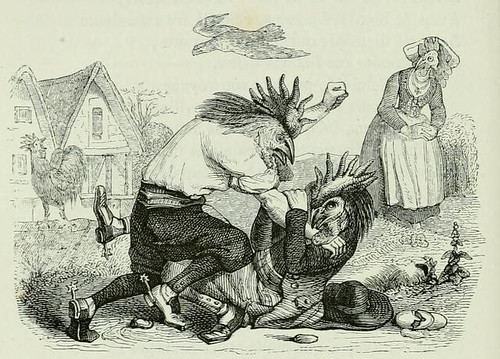Here is a round-up of today's blog posts - and for previous posts, check out the Bestiaria Latina Blog archives. You can keep up with the latest posts by using the RSS feed, or you might prefer to subscribe by email. I'm Twittering again now at Aesopus and AesopusEnglish.
HODIE: ante diem duodecimum Kalendas Octobres (and yes, you can have your own Roman Google Calendar).
VERBUM HODIERNUM: Today's word is the little preposition DE - read a brief essay about the word at the Verbosum blog. Here's one of the sayings you can find in the essay: De te fabula narratur, "The fable speaks about you" - even if it might look like the fable is about talking animals, for example!
MILLE FABULAE: New materials at the blog include a slideshow for the Speculum Sapientiae (wow! I never thought I would find an illustrated edition of that text) and lots more illustrated fables. This is also where you can download your free PDF copy of the Mille Fabulae et Una book.
FABULAE FACILES: The new easy-to-read fable is Capra in Rupe Stans et Lupus, the story of a sneaky wolf and a very wise goat!
PODCASTS: Today's Latin audio fable is Galli Inter Se Pugnantes, a great story about how fleeting victory can be!
ENGLISH AESOP: Today's English fables are from Sir Roger L'Estrange and also from the Herford Aesop in verse.
TODAY'S MOTTOES & PROVERBS: Widgets available at SchoolhouseWidgets.com.
Tiny Mottoes: Today's tiny motto is: Sine metu (English: Without fear).
3-Word Proverbs Verb-less: Today's 3-word verb-less proverb is Nulla salus bello (English: There is no safety in war)
Audio Latin Proverb: Today's audio Latin proverb is Mus satur insipidam diiudicat esse farinam (English: The mouse, when full, considers the flour insipid). To read a brief essay about this proverb and to listen to the audio, visit the Latin Via Proverbs blog.
Maxims of Publilius Syrus: Today's proverb from Publilius Syrus is: Incertus animus dimidium est sapientiae (English: A mind that doubts is halfway to wisdom).
Animal Proverb from Erasmus: Today's animal proverb from Erasmus is Multi qui boves stimulent, pauci aratores (English: Many are those who drive the oxen, but few are the real ploughmen; from Adagia 1.7.9).
For an image today, here is Grandville's wonderful illustration for the story of the two roosters fighting: 563. Galli Inter Se Pugnantes. Galli duo, ut eorum mos est, inter se de ducatu gallinarum acerrime certabant. Qui superior in pugna fuerat, alarum plausu vocisque cantu se victorem fuisse significans, Venere et otio emarcuit. Victus autem, a conspectu gallinarum profugiens, cum cornicibus et pavonibus sese quotidie pugnando exercebat; inferendi vitandique ictus artem ediscebat. Qui, ubi se satis instructum vidit, rediens, adversarium ad pugnam provocatum nullo negotio superavit.
